Girvan Folk Festival 2018 – 4th – 6th May
GUESTS INCLUDE: The Tannahill Weavers; Len Graham & Jack Lynch; Rita Gallagher; Lori Watson Trio; George Duff, Kevin MacLeod, John Martin, Leo McCann; Nick Dow; Eddie Seaman & Luc McNally; Maggie MacInnes Trio; Margaret Bennett; Susan McClure; Aileen Carr; Haggerdash; Fàilte; The Barrstools; Suitcase Circus; Irma Helou; The Tattiehowkers Ceilidh Band.
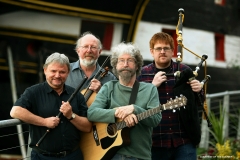
The Tannahill Weavers – Over the years the Tannies have been trailblazers for Scottish music. In 2011 the band was inducted into the Scottish Traditional Music Hall of Fame, and in 2014 they were joined by innovative piper Lorne MacDougall. With their 50th anniversary in 2018, the Tannahill Weavers are firmly established as one of the premier groups on the concert stage. From reflective ballads to footstomping reels and jigs, the variety and range of the material they perform is matched only by their enthusiasm and lively Celtic spirits.
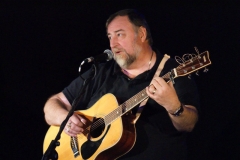
As a guitar-accompanied singer, he sounds startlingly like Nic Jones, unaccompanied, he’s really a good and interesting singer.
Nick Dow is an all-round professional folk singer and folklorist, singing and researching English and Irish traditional songs, taught and encouraged by traditional singers from Dorset and Lancashire as well as singers from the travelling people. He also builds and restores gypsy wagons. Nick is an acknowledged expert on West Country folk song. Together with his wife Mally, has collected over 300 songs in Dorset, and discovered singers in Lancashire & Essex. He has also made recordings of gypsy singers, some of which have been included on Topic Records ’The Voice of the People’. Nick has lived an amazing life, travelling half way round the world, living on the road with the travelling folk and learning their songs, working as a TV and Film Extra, broadcaster, Narrowboat painter, writer, Folklorist, Guitar Teacher General Dealer. Every song Nick sings has a story attached to it, and his gigs are as informative as they are entertaining.
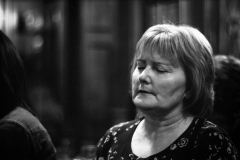
This year’s Gradam for Amhránaí na Bliana (Singer of the Year 2017) goes to RITA GALLAGHER
Upon hearing this distinctive traditional singer, one is immediately aware one is listening to a vocalist of incredible ability. Her mastery of tone, breath, and ornamentation, coupled with her extensive knowledge and understanding of songs, from her native South Donegal and beyond, leave one in no doubt that one is truly in the presence of greatness. A three-time winner of the Comhaltas All-Ireland title for female singing in English, her extensive repertoire contains many exceptionally challenging songs, all of which she makes sound effortless.
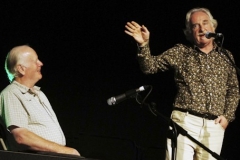
Len Graham & Jack Lynch
Tall tales, splendid songs and wickedly wise words. Two of Ireland’s finest performers conspire to delight you with an entertaining show of great songs and heart-warming stories.
Len Graham was born in County Antrim. His father, a fiddler, brought him to sessions in the local area as a young boy. Throughout the 1960s, Len travelled around Ireland to record and preserve folk songs, befriending singers such as Joe Holmes and winning the All Ireland Fleadh Cheoil na hÉireann traditional singing competition in 1971, an important accolade for Irish traditional musicians around the world. Len Graham went on to collaborate with other poets and seanchaithe and storytellers. Since collecting songs from Ulster’s older traditional singers, among them Eddie Butcher and Joe Holmes, his association with John Campbell would begin a 20-year collaboration of story and song. During the 1980s–90s, Graham and Campbell would bring their events and work to cross-community groups around Ireland, especially to the north which was experiencing armed conflict. Since John Campbell’s passing in 2006, Len has toured regularly with storyteller Jack Lynch.
Renowned storyteller Jack Lynch weaves his hilarious tales with sensitivity and expertise. Dublin-born Jack Lynch is rooted in the scéalaí tradition as explored by Eamon Kelly and John Campbell, having shared a stage with both. He has experience in schools, libraries and prisons. He works regularly in the National Museum of Ireland and he has been a teller at local arts festivals and at Irish storytelling festivals. Jack is a founder member and current chairman of Storytellers of Ireland / Aos Scéal Éireann and of the Dublin Yarnspinners. In 2007 and 2009 Jack co-curated the biennale Farmleigh Festival of Story and Song in Dublin. Jack was curator of If Walls Could Listen, a storytelling Festival for Derry/Londonderry in August 2013 and in 2014 was guest curator of the Yarn Storytelling Festival in Bray, Co. Wicklow. Jack is a member of the Hakaya network, which is part of the Arab Education Forum. In 2015 he was the English language Copy-editor of Timeless Tales, a publication, in Arabic and English, of 25 traditional tales collected from Syrian refugees in camps in The Lebannon in 2014. When working with young people, Jack draws on stories from many corners of the world and encourages the collection of reminiscences from grandparents.
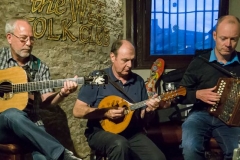
George Duff, Kevin Macleod, John Martin and Leo McCann
George, Kevin, John and Leo play together regularly in Edinburgh’s session haunts bringing a lifetime of traditional music and song expertise bound together by friendship and a love of music.
George Duff is a fine singer, often heard in a supportive role in the company of other great singers such as Cathal McConnell. In this lineup of genuine, yet modest, superstars you will hear an extraordinary combination of fine singing and consummate musicianship. Kevin Macleod is master of many stringed instruments, having produced three solo CDs on Greentrax and a joint recording with Highland accordion player Ali ‘Beag’ MacLeod. He has toured and appeared with Irish group De Danann and worked with well-known Irish musicians Alec Finn and Frankie Gavin. As member of The Occasionals, Kevin has been as key figure in Scottish dance music for most of his life. His connections with Girvan stretch back to appearances with The Occasionals and almost thirty years ago alongside Freeland Barbour as the core The William Grants All Star Ceilidh Band. Leo McCann from Benburb, Co Tyrone, in the north of Ireland is a well-known button box and tin whistle player and has been based in Scotland for over twenty years, performed in many groups such as Drop The Box, Corner House, Iron Horse and Malinky. He has recently recorded with American bluegrass legends Ben Winship and Tim O’Brien. John Martin is still a member of The Tannahill Weavers, but his pedigree and position of one of Scotland’s master fiddlers spans his time with legendary groups including Contraband, Ossian and The Easy Club. John spends much of his time touring with The Tannahill Weavers but whenever he is back home he plays for fun in what is a quite extraordinary lineup of musicians.
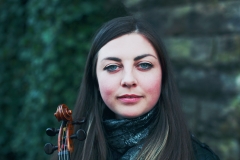
Brought up in the Scottish Borders, Lori Watson now resides in Glasgow, her birthplace. She has been playing the fiddle since the age of 10, is a singer and interpreter of Scots and traditional song and composer of tunes, songs and innovative works.
Lori Watson – graduated with a BA honours in Scottish Music from the Royal Scottish Academy of Music and Drama in 2003. In her final year, Lori specialised in performance, composition, broadcasting and research with a particular interest in her musical roots – the rich traditions of the Scottish Borders. Lori completed her PhD in Artistic Research and Ethnomusicology through the Royal Conservatoire of Scotland and the University of St Andrews in 2013, which explored issues surrounding creativity and innovation in a contemporary Scottish context, principally through her own creative practice and experiments in the world of traditional music. Her research is currently being prepared for several publications including a Cambridge University Press title. Lori is an award-winning performer, appearing solo and with groups. She was a BBC Scotland Young Traditional Musician finalist in 2002 / 2003. Performing extensively throughout the UK, Europe and Canada, broadcasting on radio, television and the internet throughout the world and working with artists such as Cara Dillon, Karine Polwart, Cathal McConnell, David Francey, Iain Morrison, The Unusual Suspects and Scottish Women has confirmed Lori’s reputation as a leading traditional musician of her generation.
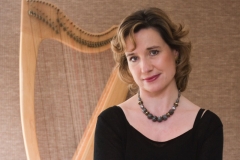
Maggie MacInnes
Maggie MacInnes comes from a long line of Gaelic singers from the island of Barra in the Outer Hebrides of Scotland and learned most of her songs from her mother the highly acclaimed traditional singer, Flora MacNeil M.B.E.
Maggie MacInnes sings and plays the clarsach. She was born in Glasgow and now lives in Ayrshire. She comes from a long line of Gaelic singers from the small island of Barra in the Outer Hebrides of Scotland and learns most of her songs from her mother the highly acclaimed traditional singer, Flora MacNeil M.B.E. Maggie has performed in various groups over the years such as Ossian, Fuaim, Eclipse First and The Maggie MacInnes Band and she has travelled widely with her music touring in many parts of Europe, U.S.A. and Canada. She also appears frequently on Radio and Television both at home and abroad.
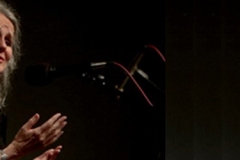
Margaret Bennett
Margaret Bennett was brought up in a family of tradition bearers, Gaelic on her mother’s side (from Skye) and Lowland Scots on her father’s. In 2012 she was made an Honorary Professor of the Royal Scottish Academy and is widely regarded as ‘Scotland’s foremost folklorist’.
Margaret Bennett is a folklorist, writer, singer and broadcaster. She was brought up in a family of tradition bearers, Gaelic on her mother’s side (from Skye) and Lowland Scots on her father’s. School years were spent in Skye, Lewis and Shetland before studying in Glasgow. In the mid-sixties, the legendary Hamish Henderson, singer, poet, folklorist and political activist inspired her career choice. In 1968 she emigrated to Canada to study Folklore at Memorial University of Newfoundland, after which she spent a year in Quebec as a folklorist for Canada’s Museum of Civilization. From 1984 to 1996 she lectured at The University of Edinburgh’s School of Scottish Studies and now teaches part-time at the Royal Conservatoire of Scotland. A prize-winning author, she has written ten books, contributed to over 40 others, featured on media productions and several musical collaborations with her son, Martyn Bennett (1971–2005), including the National Theatre of Scotland’s acclaimed production, ‘Black Watch’. In 2012 she was made an Honorary Professor of the Royal Scottish Academy and is widely regarded as ‘Scotland’s foremost folklorist’.
Aileen Carr
The 1960’s were exciting times for the folk revival in Scotland but it was hearing the likes of Belle Stewart at the 1967 Blairgowrie Festival that was a defining moment for Aileen – not to mention the day she was given, at teacher training college, a copy of Norman Buchan and Peter Hall’s 1973 ‘Scottish Folksinger’.
Aileen Carr was born in Coupar Angus, in Perthshire. Her father, self-taught on the melodeon, had a fine Scots voice, while her mother also sang and played the piano at musical evenings at home. Aileen’s family could not afford piano lessons for her but that didn’t hold back Aileen’s interest in music and song. In true folk singing style she would happily sing to people as a little girl and as a teenager was encouraged to sing and perform with a local concert party. The 1960’s were exciting times for the folk revival in Scotland but it was hearing the likes of Belle Stewart at the 1967 Blairgowrie Festival that was a defining moment for Aileen – not to mention the day she was given, at teacher training college, a copy of Norman Buchan and Peter Hall’s 1973 ‘Scottish Folksinger’. On her family moving to Goole in Yorkshire, Aileen became a floor singer at the South Cave folk club and at the Bluebell Club in Hull, where she met many performers such as Alison McMorland and Archie Fisher. In the 1970’s she returned to Scotland and became a regular solo singer at St Andrews and other folk clubs, performing at Kinross Festival and throughout Britain and Ireland. In the 1980’s she joined Ceolbeg for a time and later became a member of the highly popular a capella group, Palaver.
Aileen continues to sing solo, and over and above her clear, disciplined performances and her excellent, powerful singing voice, her most important attribute is the way she persistently searches out fresh and interesting material from both sung and printed sources, constantly researching texts, tunes and history. Although an eclectic singer in the true folk tradition, it is the great classical story ballads – especially Scottish – and their rich history that she enjoys most of all.
Irma Helou
Irma tells to all ages, from small children to adults, and in recent years, has become a celebrated member of a Europe-wide network of storytellers.
Irma first studied theatrical performance, developing an interest in working as a clown. In time she realised that she did not get the satisfaction working under a Director. It was then that she ‘fell in love’ with the art of storytelling, allowing her total freedom to become the author and where her own personality gives her freedom. Irma recognised the spiritual depth of folktales and, by 2000 she decides to make a full commitment to storytelling. She tells to all ages, from small children to adults, and in recent years, has become a celebrated member of a Europe-wide network of storytellers. She has appeared at Festivals in Spain, Sweden and Switzerland as well as her native France. This will be her first visit to Scotland. For her the traditions and deep meaning of stories is, for Irma, a great responsibility to be shared with her Girvan audience.
Susan McClure
Susan developed her love for singing when she became aware of the power of song during the 1984 miners strike activities in Glasgow.
Susan developed her love for singing when she became aware of the power of song during the 1984 miners strike activities in Glasgow. Hearing political songs led her to the Star Folk Club where she enjoyed many traditional performers and from there discovered the traditional festivals. Girvan Festival was where she found her voice when she entered and won the prize for first time entrant in a singing competition. It is then, very fitting that she comes as a guest this year. Her passion and commitment to political song continued, fostered by being part of Eurydice, Glasgow’s socialist women’s choir. Susan has been influenced by so many singers, that it is very difficult to single out any but if pressed she would acknowledge her debt to Gordeanna McCulloch, and Alison McMorland who led her to the source singers , the Stewart of Blair and Lizzie Higgins. Susan talks about the pure joy of singing, listening to other singers and joining in singarounds and her beautiful, sensitive singing style reflects how well she listened to all these influences around her.
Eddie Seaman and Luc McNally
Eddie, a talented piper and whistle player and Luc, a guitarist, box player and traditional singer are both products of that great seam of talent which has emanated from the Royal Conservatoire of Scotland.
Eddie, a very talented piper and whistle player and Luc, a guitarist, box player and traditional singer are both products of that great seam of talent which has emanated from the Royal Conservatoire of Scotland. As hard working musicians, they are part of several working groups, including Barluath. Luc, originally from Dipton, County Durham has been part of Kathryn Tickell’s Band Orchestra and worked a lot at The Sage in Newcastle. He has been part of several exciting new bands including Dosca and Sketch and is currently in great demand as an accompanist for emerging new talent like Iona Fyfe. He was also a finalist in the Young Traditional Musician of the Year but had to withdraw due to injury. Eddie is also a vital member of several hard working music groups. He hails from Edinburgh where he started in the school band, moving on to Plockton National Centre for Excellence for Traditional Music where he was taught by Iain MacFadyen and Hamish Napier. He studied 4 years at the Conservatoire where he became part of the very successful band Barluath. Eddie and Luc will be appearing as a duo at Girvan. A listen to their album ‘Tirade’ lets us know that these boys have dipped into the well of tradition and are pouring out bucketfuls of the best of music and song.
HAGGERDASH
HAGGERDASH have been a prominent feature of the Scottish Folk Music scene for nearly thirty years no w.The current HAGGERDASH line-up is Alan Jones, Jack Bethel and Billy Stewart. Together they perform with an wide range of instruments including hammered dulcimer, concertina,bouzouki, guitar, fiddle, whistles, harmonicas, 5 string banjo and bodhran. Alan and Billy provide vocals on songs which include many of their own compositions. Over many years Alan, Jack and Billy have been part of other groups as well as performing solo. Those lineups included Setanta, Three’s A Crowd, Cairdie’s Brig and Hot Toddy. HAGGERDASH have performed at many Festivals and Folk Clubs at home and abroad over the years and there are none better at creating a feel good factor and connecting with their audience.
THE BARRSTOOLS
Taking liberal inspiration from everything from the likes of Woody Guthrie to Bruce Springsteen, Fred Morrison to Skippinish and the Dubliners to We Banjo 3, The Barrstools blend of musicianship and craic has quickly become a music festival mainstay.
The Barrstools are a local 6 piece band with their roots, as the name suggests, lying in the Village of Barr in South Ayrshire. Originally the founding members of Dave Sherry and Quentin “Cutty” Fyfe shared vocal duties along with their guitar, banjo and whistle. The subsequent additions of accordionist Stewart Robertson and multi-instrumental piper Hamish Denham,and latterly the rhythm section in the form of percussionist Kevin Borland and the double bass of Harry Sheddon, provides the Barrstools with their unique take on drinking songs from pubs across the Atlantic and closer to home, alongside traditional tunes with modern twists. Taking liberal inspiration from everything from the likes of Woody Guthrie to Bruce Springsteen, Fred Morrison to Skippinish and the Dubliners to We Banjo 3, The Barrstools blend of musicianship and craic has quickly become a music festival mainstay.
Fàilte
These guys from around County Derry, N .Ireland are first and foremost entertainers who play the best of traditional music in an engaging and relaxed style. They are George Murphy on guitar and vocals, Frank Cassidy on bazouki , guitar and vocals, Adrian(Jaff) Jeffries on uillean pipes and Sean Hegarty on boudhran. They achieve a good mix of traditional and contemporary songs and exciting fast traditional tunes.
The Tattiehowkers Ceilidh Band
The Tattiehowkers have been the band to contact for playing for dance ceilidhs in Ayrshire for 30 years. Formed to play for a one–off fundraiser for Kilmarnock Folk Club in May 1988, they then were asked to play at the Glasgow Folk Festival ,a second gig they had not been expecting.
The band then continued to be very much in demand during the ceilidh craze of the nineties and are still playing regularly. They have a vibrant full sound ,making the most of their 5/6 piece line-up of piano, fiddle, mandolin/banjo,melodeon,bass and percussion. Their caller/pianist Maggie Macrae is the vital link to the dancers, talking them through all the dances.The other permanent members of the band are Gordon Potter, Bob Urquhart, James Macrae, Aly Macrae, and Alan McLeod but on many occasions like,for example Girvan Folk Festival the Tattiehowkers become a very elastic band , expanding to include other musicians like Rosie Lindsay and Carol Anderson.
